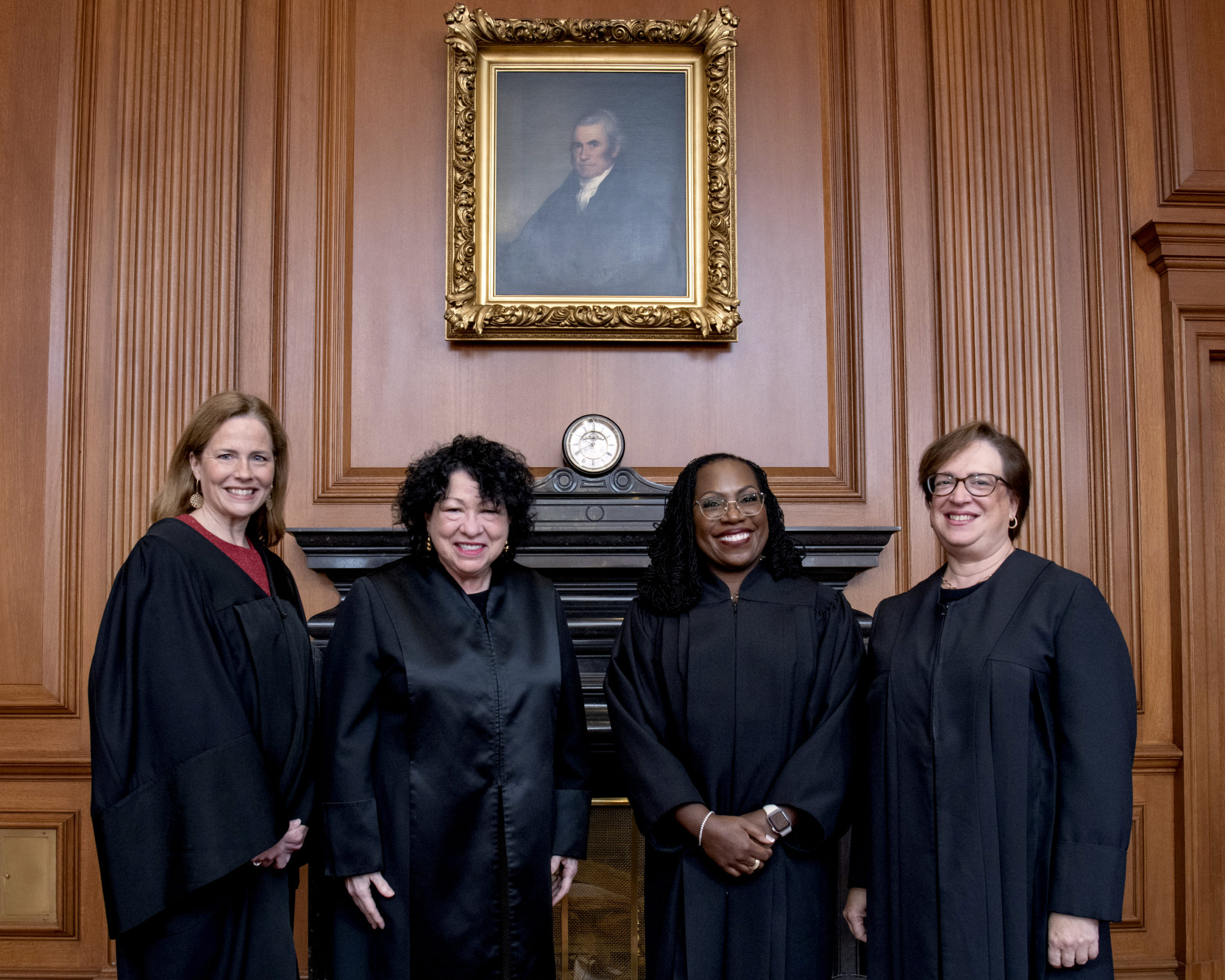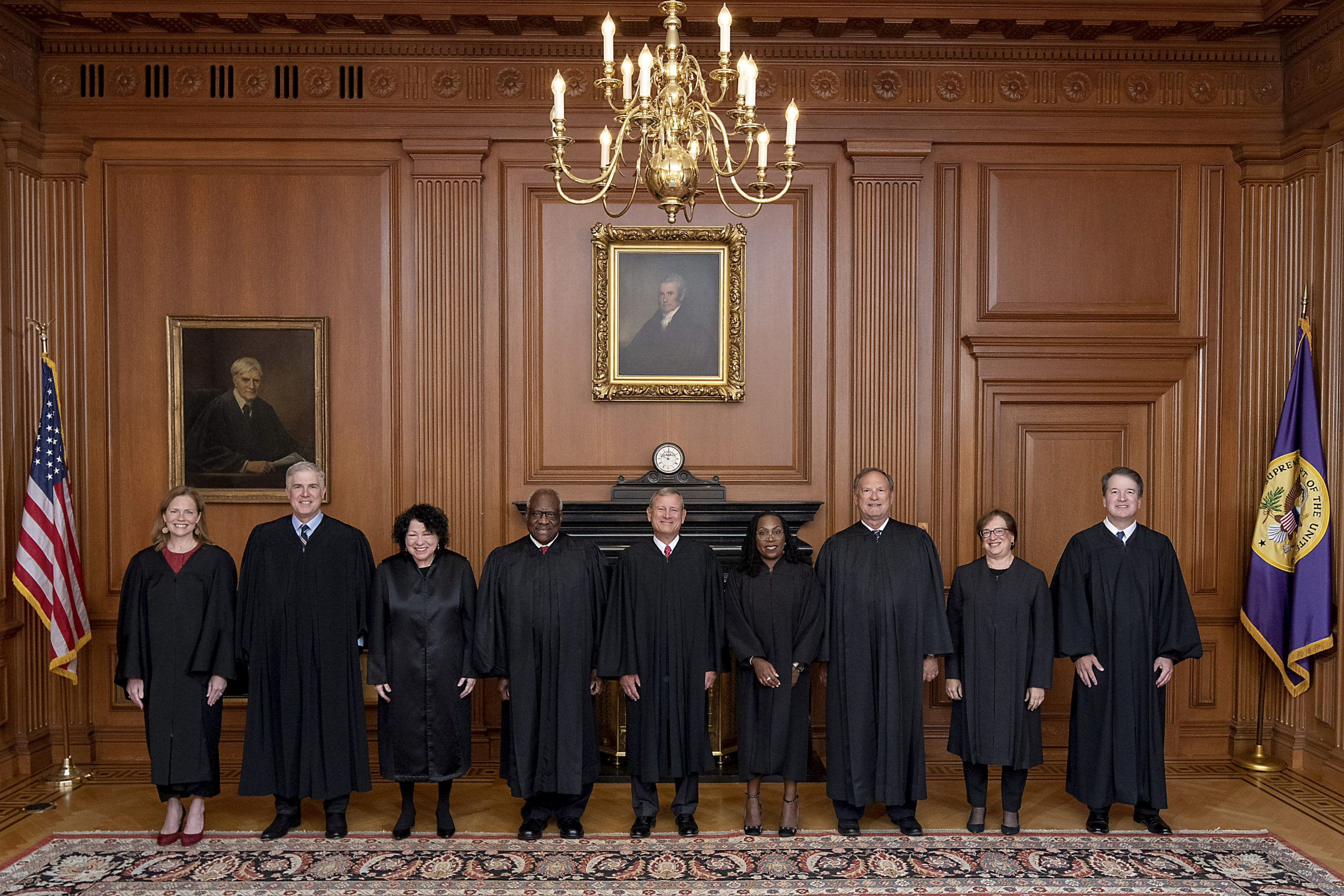
First Monday in October

(The Nine Justices of the Supreme Court, October 2022)
Several things strike me as notable about the photo above. First, all of the Justices of the Supreme Court are smiling — showing at least some comity for the camera. Second, there are now FOUR women! I’m old enough to remember when there were exactly ZERO women on the Supreme Court, so this evolution, while slow and somewhat imperfect, is still notable. Third, but perhaps most important, there are TWO African American justices, including Justice Ketanji Brown Jackson who was sworn-in on Friday as the first Black woman to reach the high bench. While it’s manifestly true that neither race nor gender signify particular outcomes, yet, the presence of more diversity than ever before surely will contribute over time to the continuing evolution of this most traditional, some would say most imperviously obtuse branch of government.
The Supreme Court convenes on the First Monday in October every year. This year, the Court convenes in an era of epic mistrust in its ability to issue rulings dispassionately, free from political bias. The Pew Research Center wrote on September 1, “Americans’ ratings of the Supreme Court are now as negative as – and more politically polarized than – at any point in more than three decades of polling on the nation’s highest court.” Pew research shows that just 48% of the general public hold a favorable view of the court, with a wide partisan divide in which only 28% of Democrats view the court favorably compared to 73% of Republicans. A June 2022 Gallup Poll put the public opinion into even starker relief, with just 25% of the public expressing a “great deal of confidence” in the Supreme Court — and that poll was taken before the Dobbs v. Jackson Women’s Health Organization ruling overturning Roe v. Wade at the end of June.
While the controversy surrounding the Dobbs decision to overturn half a century of constitutional protection for a woman’s right to choose to have an abortion — the controversy included an unprecedented leak of the draft opinion written by Justice Alito — the problem of public trust in the court has much deeper roots and will be much harder for the current court to resolve. Some commentators trace the issue back to the Court’s 2000 ruling in Bush v. Gore concerning disputed vote counting in Florida; the decision had the effect of awarding the 2000 presidential election to the Republican candidate George W. Bush. All of the members of the Court who were appointed by Republican presidents voted in favor of Bush. Democrats decried the result as partisan politics, but the Democratic candidate Al Gore conceded and Bush became the president.
However, the much bigger problem for the Court’s legitimacy arose at the end of the Obama Administration when, after the death of Justice Antonin Scalia, Senate Majority Leader Mitch McConnell refused to move forward with the Senate confirmation process for President Obama’s nomination of Merrick Garland for the open seat on the court. At the time, McConnell claimed that since the vacancy occurred in a presidential election year, the nomination should wait until the results of the election were in so that “the people” could decide. And yet, in 2020, when another vacancy occurred in the middle of a presidential election season, McConnell did not hesitate to push through President Trump’s nomination of Amy Coney Barrett.
After the Garland affairs, President Trump was elected and he proceeded to nominate the very conservative Neil Gorsuch to succeed Justice Scalia. Gorsuch’s nomination was modestly controversial but he was approved and took the bench. However, a year later, when Justice Anthony Kennedy suddenly stepped down from the Court, fireworks broke out in the nomination hearings for Brett Kavanaugh who was accused of sexual misconduct when he was a student at Georgetown Prep. Kavanaugh was confirmed but bitterness lingered, and then the rushed nomination and confirmation process for Justice Barrett compounded the problem of eroding trust in the Court. The fact that the Trump nominees were all picks supported by the ultra conservative Federalist Society did not help the cause of impartiality.
The Dobbs decision seemed to be the inevitable result of a nomination process that appeared to be deeply corroded by political considerations. In truth, virtually all Supreme Court nominations have a political context since presidents nominate justices based on their own party’s views of how the Court should interpret the law. But few presidents get to pick three justices in a relatively short period of time, and the Trump appointments contributed to a significant shift in the ideology of the Court. The Dobbs decision was a predictable result, the overturning of a precedent that a majority of Americans believed was long settled.
Over the summer of 2022, the justices, themselves, engaged in a remarkable public display of criticism, with Justice Alito giving a speech on religious liberty that mocked critics of the Dobbs decision, and Justice Kagan spoke at a conference in which she said that judges who inject their personal preferences create legitimacy problems for the Court. Meanwhile, Chief Justice Roberts said that just because people disagree with a Court decision does not mean the Court is illegitimate, a statement that seemed to add fuel to the fire rather than quenching it.
The real test of the Court’s legitimacy and ability to regain public trust will come in this term which has a number of critically important cases on the docket, from affirmative action in higher education to voting rights, gay rights, environmental protection and a host of other important issues. It’s worth reading the excellent summary of pending cases by Ruth Marcus in the Washington Post.
Whatever the outcomes of the new Supreme Court term, Americans must remember that We the People are the ones who hold the ultimate power in this democracy. If we don’t like what’s going on, we need to VOTE and we need to let our Congressional representatives know what we expect of them in law and legislation. We cannot be passive about our constitutional rights; we must be informed and we must take an active approach to protecting our fundamental rights. This is what it means to be citizens in a democracy. We cannot just say that this or that branch of government is oppressive — we have the power to create change, and we should exercise that power at every opportunity. Too many Americans sit out elections. The results of the last ten years might have been very different had all Americans exercised their responsibility to vote. When citizens stay home, authoritarians take over. We are paying the consequences today, but we can change that for the future. Starting this fall — the 2022 mid-term elections are very consequential. Get up, get out, and VOTE!